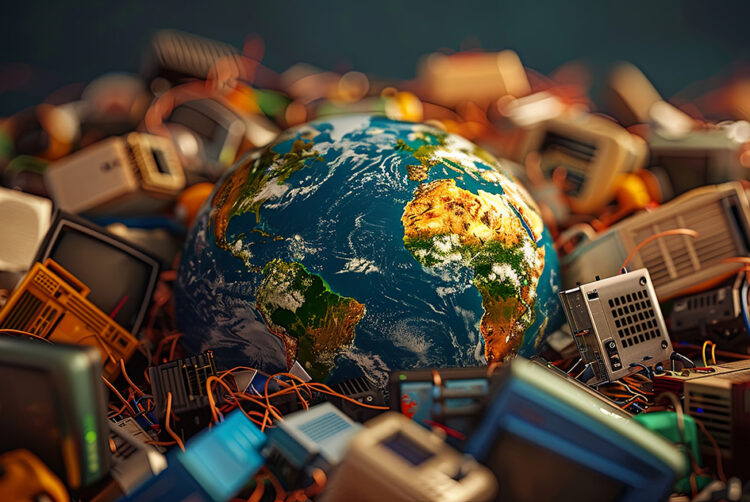Hasta la vista, sustainability: How AI is a distraction from our climate commitments

Opinion
The rise of AI can add to the industry’s bloated emissions, while in the short term there’s a danger that we’re losing time at a critical moment in the climate crisis.
For decades, we’ve worried about the impact AI will have on our planet.
Yet there’s one issue AI poses that even the fevered imagination of James Cameron probably couldn’t have dreamed up. Well, he might have, but it’s not exactly something you’d splash all over a slick Hollywood poster.
It’s that AI has become such a distraction that we’ve allowed it to take our focus away from other important areas — such as climate change.
A recent Microsoft report suggested that the software giant’s bold pledge to remove more carbon than it emits by 2030 is now under threat. Not because it has backtracked on its climate commitments, but because the company’s pursuit to become the global AI leader has meant its emissions have risen by 30%, driven by the construction of energy-intensive new data centres to meet growing AI needs.
The rise of AI can add to the industry’s bloated emissions, while in the short term there’s a danger that we’re losing precious focus and time at a critical moment for the industry’s response to the climate crisis.
Slipping down the agenda
It’s a worrying trend that seems to be playing out across the ad industry. Back in 2022, there was a huge focus on advertisers doing all they could to address the growing negative impact digital advertising has on the planet. However, in recent months, calls for a more sustainable online ad ecosystem seem to have been put to one side.
Of course, ask any marketer and they will ardently deny this. But you only need to look across the ad landscape to see that sustainability has slipped down the agenda.
Not so long ago, you couldn’t move around an industry event without bumping into a sustainability panel, while every day we were treated to a daily diet of climate headlines in the trade press. Not any more.
This is reflected in a recent poll of ad leaders. While climate was a hot topic of conversation in the previous year’s report, 12 months on it barely got a mention.
These days, there’s been such a steep decline in focus on the topic that you could almost be fooled into thinking the danger had disappeared altogether. Of course, with reports claiming last year’s summer was the hottest for 2,000 years, the reality is anything but.
It’s something that hasn’t gone unnoticed by many people across the industry, with 50% of employees believing their agency could be doing more, while 70% think the industry needs to step up.
A 2022 McKinsey & Company report revealed that 70% of consumers would be willing to pay a premium for sustainable products. Fast forward a few years to a cost-of-living crisis and public attitudes to the climate crisis have also coarsened.
Alarmist headlines warning of impending disaster have desensitised some people to the message, while greenwashing brands being called out for their little green lies have fostered a growing scepticism.
Top of the agenda
So what can be done to put sustainability back at the top of the agenda?
Well, first, we need politicians ready to commit to long-term change and not bend depending on whichever direction the wind is blowing at that time. That will provide businesses — many struggling to deal with the impact of recent economic and political turmoil — with the certainty they need to make lasting, sustainable choices.
Only through close collaboration between governments, businesses and society will we make meaningful progress.
But adland also needs to stand up. As an industry, we’re always keen to hail bravery. Well, it’s time we did the same for those willing to make the small but significant company-wide changes needed that will have a huge impact on digital advertising’s oversized carbon footprint.
Climate change can’t be fixed overnight. But there are things marketers can do right now to their media planning and processes that will reduce emissions significantly. So if you feel you need to be doing more, why not ask your manager to set you your own set of targets? Every ad impression counts, so any day-to-day changes you can make to minimise emissions can have an impact.
Rather than chase splashy headlines, we need to be honest with consumers about the slow and steady progress that’s been made and what you’re prepared to do to fix it. Businesses must demonstrate genuine commitment through concrete actions, not rhetoric. More hot air is the last thing the planet needs.
Marketers are great at promoting their businesses, but they’re not climate scientists, so it’s important the industry addresses these gaps in knowledge by giving employees access to adequate training and education resources.
Act now
We have no time to waste. We can’t look away. We need to keep in mind that the decisions we make today will impact the rest of our children’s lives, as the lifespan of CO2 means it remains in the atmosphere for over 100 years.
Marketers must act now. Their role in helping to reduce advertising’s impact on the environment is crucial. Plus, with the help of companies like Impact+, they can see the positive progress that can be achieved every single day.
Future-facing companies that recognise sustainability is good for business and not just a box-ticking exercise are already making these changes, with those slower to act likely to be left behind.
Yes, stepping up on your climate commitments requires time, resources and, crucially, attention. But the alternative — which will cost you the Earth — is a price no-one wants to pay.
 Marion Cardona is chief operating officer and co-founder of Impact+
Marion Cardona is chief operating officer and co-founder of Impact+




